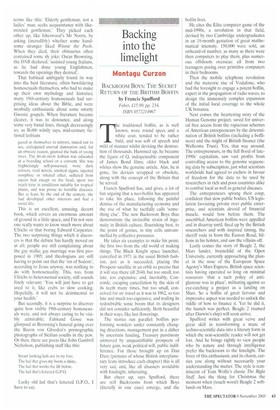Backing into the limelight
Montagu Curzon
BACKROOM BOYS: THE SECRET RETURN OF THE BRITISH BOFFIN by Francis Spufford Faber, £15.99, pp. 234, ISBN 0571214967 The traditional boffin. as is well known, wore round specs and a white coat, tended to be rather
bald, and was soft of speech and mild of manner whilst devising the destruction of thousands. Hammed up, he became the figure of Q, indispensable component of James Bond films; older black and whites show the genuine article. Alas, he is gone, his devices scrapped or obsolete, along with the concept of the Britain that he served.
Francis Spufford has, and gii,es, a lot of fun arguing that a neo-boffin has appeared to take his place, following the painful demise of the manufacturing economy and the rise of what he tactfully calls 'something else'. The new Backroom Boys thus demonstrate the invincible strain of ingenuity in British culture, flourishing best, to the point of genius, in tiny cells untrammelled by collective pressures.
He takes six examples to make his point, the first two from the old world of making things. The Black Knight space launcher, cancelled in 1971 in the usual British fashion, just as it succeeded, placing the Prospero satellite in an orbit so precise that it will stay there till 2040, but too small, too late, too expensive; and, inevitably, Concorde, escaping cancellation by the skin of its teeth many times, but too small, conceived for air travel as it was in 1962, so too late and much too expensive, and trailing its redoubtable sonic boom that its designers did not consider sufficiently. Both beautiful in their ways, like last flowerings.
The stories run parallel: boffins performing wonders under constantly changing directions, management put in a dither by uncertain funding, Treasury parsimony unmoved by unquantifiable prospects of future gain, weak political will, public indifference. For those brought up on Dan Dare (pictures of whose British interplanetary feats introduce each chapter) this is all very sad, and, like all disasters avoidable with hindsight, infuriating.
But cheer up, says Spufford, there are still Backrooms from which Boys (literally in one case) emerge, and the boffin lives.
He cites the Elite computer game of the mid-1990s, a revolution in that field, devised by two Cambridge undergraduates in an 18-month gestation of great mathematical intensity. 150,000 were sold, an unheard-of number, as many as there were then computers to play them, plus numerous offshoots overseas: all from two teenagers poring over primitive computers in their bedrooms.
Then the mobile telephone revolution and the meteoric rise of Vodafone, who had the foresight to engage a potent boffin, expert in the propagation of radio waves, to design the immensely complex expansion of the initial local coverage to the whole UK bonanza.
Next comes the heartening story of the Human Genome project, saved for universal free access from the rapacious schemes of American entrepreneurs by the determination of British boffins (including a boffiness) and the might of British finance (the Wellcome Trust). Yes, that way around. The entrepreneurs, in the full flood of late1990s. capitalism, saw vast profits from controlling access to the genome sequencing data by subscription, just what scientists worldwide had agreed to eschew in favour of freedom for the data to be used by researchers in rich and poor countries alike to combat local as well as general diseases.
The entrepreneurs sprang their coup, confident that slow public bodies, US legislation favouring private over public enterprise, and scientists devoid of financial muscle, would bow before them. The assembled American boffins were appalled and in disarray until, fired up by the British researchers and with inspired timing, the sheriff rode in from the Euston Road, billions in his holster, and saw the villains off.
Lastly comes the story of Beagle 2, the Mars Lander, brainchild of the Open University, currently approaching the planet in the nose of the European Space Agency's Mars Express, British space scientists having operated so long on minimal resources 'that a tacit policy of antiglamour was in place', militating against so eye-catching a project as a landing on Mars. So a boffin of great fervour and impressive aspect was needed to unlock the riddle of how to finance it. Yet he did it, the launch was perfect, Beagle 2 (named after Darwin's ship) will soon arrive.
Spufford writes with great verve and great skill in transforming a maze of techno-scientific data into a literary form in which the non-scientific reader will not get lost. And he brings rightly to view people who by nature and through intelligence prefer the backroom to the limelight. The force of this enthusiasm, and its charm, carries you along without necessarily your understanding the matter. The style is reminiscent of Tom Wolfe's classic The Right Stuff. Just the thing for Christmas the moment when (touch wood) Beagle 2 softlands on Mars.


































































































 Previous page
Previous page